Professor Stephen Hicks
Philosophy 103
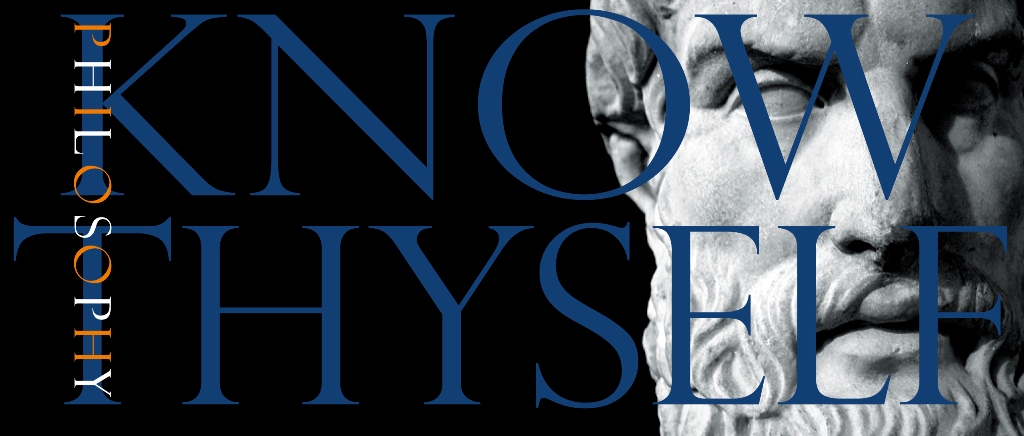
Topic 1: Philosophy and Self-Education

[Optional: Stephen Hicks on “The Story of Arachne and Athena” | Greek Mythology | Philosophers Explained series]
Stephen Hicks, “What Entrepreneurs Can Teach Us All About Life” (The Wall Street Journal, 2016).

Topic 2: Philosophy and War
William James, “The Moral Equivalent of War” (1906). [Optional: Stephen Hicks on James’s “The Moral Equivalent of War” | Philosophers Explained series]
Guest: Professor Piotr Marek Kostyło, University of Kasimir the Great, Poland: “On the war between Russia and Ukraine.”
Topic 3: Ethics and War
William James, “The Moral Equivalent of War” (1906). [Optional: Stephen Hicks on James’s “The Moral Equivalent of War” | Philosophers Explained series]
Topic 4: What is Reality? Metaphysics
Stephen Hicks, “Metaphysics.” Full lecture at YouTube. Topics:
- Introducing metaphysics: our hybrid civilization
- Two philosophical stories: The Big Bang story and the Creation story
- Comparing the two stories
Topic 5: What is Reality? Metaphysics
Stephen Hicks, “Metaphysics.” Full lecture at YouTube. Topics:
- The Argument from Design
- The Argument from Evil
- Metaphysics and method
Topic 6: What is Knowledge? Epistemology
Stephen Hicks, “Epistemology.” Full lecture at YouTube. Topics:
- Introduction: What epistemology is
- Reason — a developmental story: The Semmelweis case; The “Juliet is the sun” metaphor; Education’s epistemological mission; Asch’s conformity experiments; Milgram’s obedience experiments; Two more virtues: independence and courage; The value of reason
Topic 7: What is Knowledge? Epistemology
Stephen Hicks, “Epistemology.” Full lecture at YouTube. Topics:
- From reason to faith: Phase One: Copernicus, Bruno, and Galileo; Phase Two: the rise of natural theology; Phase Three: “I found it necessary to deny reason … ”
- Faith: Kierkegaard, Luther, and Tertullian; The story of Abraham; Kierkegaard’s lesson: Abraham as model of faith
- Educational implications: Choose your hero — Semmelweis or Abraham?
Topic 8: What is Human Nature?
Stephen Hicks, “Human Nature.” Full lecture at YouTube. Topics:
- Five issues in human nature
- The physical and the psychological: Dualism of mind and body; Reductive materialism; Integrationism; Mottos and graphics; Reasons for and against dualism
- Implications for education: The “problem child”? Physical education? Cognition: theory and/or practice? Sex education?
Topic 9: What is the Good? Ethics
Stephen Hicks, “Ethics.” Full lecture at YouTube. Topics:
- Six questions in ethics: Preamble: What is the meaning of life? 1. Nature or Supernature [Where?] 2. Reason or Non-reason (faith, tradition, feeling) [How?] 3. Universal or Relative [When?] 4. Teleology or Deontology [Why?] 5. Egoism or Altruism [Who?] 6. Values and virtues: health, wealth, pleasure, friendship … [What?]
- Our hybrid civilization: Two ethical traditions: Greco-Roman and Judeo-Christianity; The Declaration of Independence and a Priest’s Vows
Topic 10: What is the Good? Ethics
Stephen Hicks, “Ethics.” Full lecture at YouTube. Topics:
- Egoism: What is the meaning of life? Egoism: end in oneself, self-responsibility, investment, achievement; Egoism’s educational mission
- The Myth of Gyges: Predation’s solution: power, aggression, win/lose; Altruism’s solution: selflessness, sacrifice, lose/win service to others
- The Three Options chart: Role models; Cases: money, sports, sex
Topic 11: Idealism, Plato, and Immanuel Kant
Stephen Hicks, “Idealism.” Full lecture at YouTube. Topics:
- Idealist philosophy
- Plato on education: The Allegory of the Cave
- Immanuel Kant on education: Obedience, imposed discipline, disobedience, punishment
- Idealist education
Readings: Plato and Immanuel Kant.
Topic 12: Realism
Stephen Hicks, “Realism.” Full lecture at YouTube. Topics:
- Contrasting Realist to Idealist philosophy
- John Locke on education
- Realist curriculum: 3 R’s, foundational knowledge and methods Example: Science, math, and technology. Example: Physical education. Example: Art
- Theory and practice integrated: Example: Younger kids and baseball math. Example: Middle-school kids and bike-jumping. Example: High school kids, auto mechanics and theater
- Tracking issues
- Character, discipline, and liberty
Readings: Aristotle and John Locke.
Topic 13: Existentialism
Stephen Hicks, “Existentialism.” Full lecture at YouTube. Topics:
- Existentialist philosophy: God is dead; Albert Camus and “The Myth of Sisyphus”; Jean-Paul Sartre and “Existence precedes essence”; Religion and science as dehumanizing; Authentic humanism
- Existentialism’s educational implications: General themes: choice, commitment, responsibility; Curriculum; Assessment; Individualism? Contra the good-news-sunny-skies approach to life
Reading: Jean-Paul Sartre and Albert Camus.
Topic 14: Objectivism
Stephen Hicks, “Objectivism.” Full lecture at YouTube. Topics:
Introduction: Rand’s entrepreneurial philosophy
Value philosophy — romanticism, liberalism, egoism: The Romantic sense of life; Liberal politics; Rational self-interest
Metaphysics and Epistemology: “Primacy of Existence”; Consciousness as Relational; Objectivity; Empiricism; Cognitive tabula rasa; Francis Bacon’s “Nature, to be commanded, must be obeyed”
Human nature: Mind/body integration; volition; reason and emotion; tabula rasa morally
Ethics and social philosophy: Individualism: self-responsible living and the virtues; Egoism versus the false alternative of altruism or predation; Optimism: philosophy and history
Ayn Rand on education: The purpose of education; Howard Roark’s expulsion as example; Critique of mainstream education; Rand on Montessori
Montessori education: Montessori practices and principles The compatibility of Objectivist philosophy and Montessori education
Reading: Ayn Rand (and selected quotations). Maria Montessori (and selected quotations).
Topic 15: Pragmatism
Stephen Hicks, “Pragmatism.” Full lecture at YouTube. Topics:
Pragmatic philosophy: Evolution, skepticism, and democracy
John Dewey on education
Pragmatic education: Groups and socialization; Teacher as facilitator; Historical “truth”
Reading: John Dewey.
Topic 16: Behaviorism
Stephen Hicks, “Behaviorism.” Full lecture at YouTube. Topics:
- Behaviorist philosophy: Psychology and the progression of the sciences. 20th century psychology: Freud, Behaviorism, Cognitivism
- Two preconditions for a science of psychology; On scientific observation
- On correlating cause and effect: The “standard model” in psychology; The problem with the standard model; The behaviorist solution; “Black box” methodology; The assumption of environmental determinism
- Behaviorist education: Quotations from John Watson and B. F. Skinner; Behaviorism as a how of education, not a what; 2 x 2 chart of techniques; Applying what we’ve learned from psychology
- Overcoming the resistance to conditioning: Resistance 1: Behaviorism sounds so authoritarian; Resistance 2: Behaviorism makes teachers too accountable
Reading: B. F. Skinner.
Topic 17: Marxism
Stephen Hicks, “Marxism.” Full lecture at YouTube. Topics:
- Marxist philosophy: The science in “scientific socialism”: Materialism; Environmental determinism; Economic forces as fundamental; Philosophy, art, politics, and religion as superstructure; Religion as an example
- Marxist economics: The socialism in “scientific socialism”; Necessary economic developmental stages; Capitalism’s dynamic: “The rich get richer …”
- Marxist politics: Revolution, not evolution; Religion as the opium of the masses; The role of teachers in developing revolutionaries
- Marxist education: Marxist teachers in a capitalist system; Education during the dictatorship of the proletariat; Education under socialism
Reading: Karl Marx.
Topic 18: Postmodernism
Stephen Hicks, “Postmodernism.” Full lecture at YouTube. Topics:
- Postmodern versus modern philosophy: Introduction; What modernism is; The Enlightenment vision
- Post-modernism’s themes: Quotations from Foucault, Lyotard, Derrida; Problems from Marxism; Pomo: skeptical relativistic rhetoric against modern society
- Henry Giroux on education
- Postmodern education: Teacher training; Literature; History; Science
Reading: Henry Giroux. Chart: Defining Modernism and Postmodernism. A transcript of the video lecture.

[End of the course]
Other Topics
Topic One: The Beginnings of Philosophy

“Arachne and Athena.”
Stephen Hicks, “Why Philosophy Begins with Thales.”
Optional: Stephen Hicks, “Thales’ Revolution” [podcast]. [Optional: Stephen Hicks on | Philosophers Explained series]
Optional: The movie Troy (2004), based on Homer’s Iliad and starring Brad Pitt, Eric Bana, and Orlando Bloom.
Topic Two
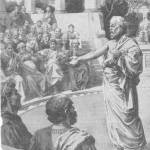
Was Socrates’ verdict just?
Plato, Apology of Socrates. The Internet Classics Archive.
[Optional: Stephen Hicks on Plato’s Apology of Socrates | Philosophers Explained series]
Topic Three
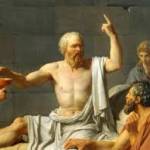
Should Socrates have escaped?
Plato, Crito. The Internet Classics Archive.
[Optional: Stephen Hicks on | Philosophers Explained series]
Topic Four
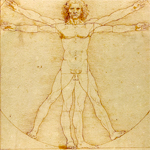
Can God’s existence be proven?
William Paley, “The Watch and the Watchmaker” (1802).
[Optional: Stephen Hicks on | Philosophers Explained series]
Optional: Kenneth Einar Himma, “Design Arguments for the Existence of God,” Internet Encyclopedia of Philosophy .
Optional: . Podcasts: “God: The ‘Design’ Argument” and “God: The ‘Evil’ Argument” [Open College]. Debate: John Wright and Stephen Hicks on seven topics about religion.
Topic Five

Is religion in conflict with science?
Galileo Galilei, “Letter to the Grand Duchess Christina” (1615).
[Optional: Stephen Hicks on Galileo’s “Letter to the Grand Duchess Christina” | Philosophers Explained series]
Topic Six
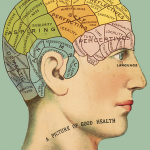
What is the relation between mind and body? How far can artificial intelligence go?
Dualism quotations from Martin Luther, St. Paul, and Lucretius.
Daniel Dennett, “Where Am I?” (1978).
Optional journalism: Heart Transplantation, Artificial Kidneys, Brain Transplants. “‘Memory transplant’ achieved in snails.” Peter Voss, “The Third Wave of AI.” Fascinating implications: bone marrow transplants, DNA, human identity, and forensics. Artificial hearts (2020).
Optional: Scott Calef, “Dualism and Mind.” The Internet Encyclopedia of Philosophy.
Topic Seven

What is individualism, and is it good or bad?
Ayn Rand, Anthem. A free print copy will be distributed. A video version is here.
Plato, “The Myth of Gyges.”
[Optional: Stephen Hicks on Plato’s “The Myth of Gyges” | Philosophers Explained series]
Optional: Walt Whitman, “Song of Myself”. Stephen Hicks, “The Myth of Gyges” [7-minute lecture excerpt].
Topic Eight
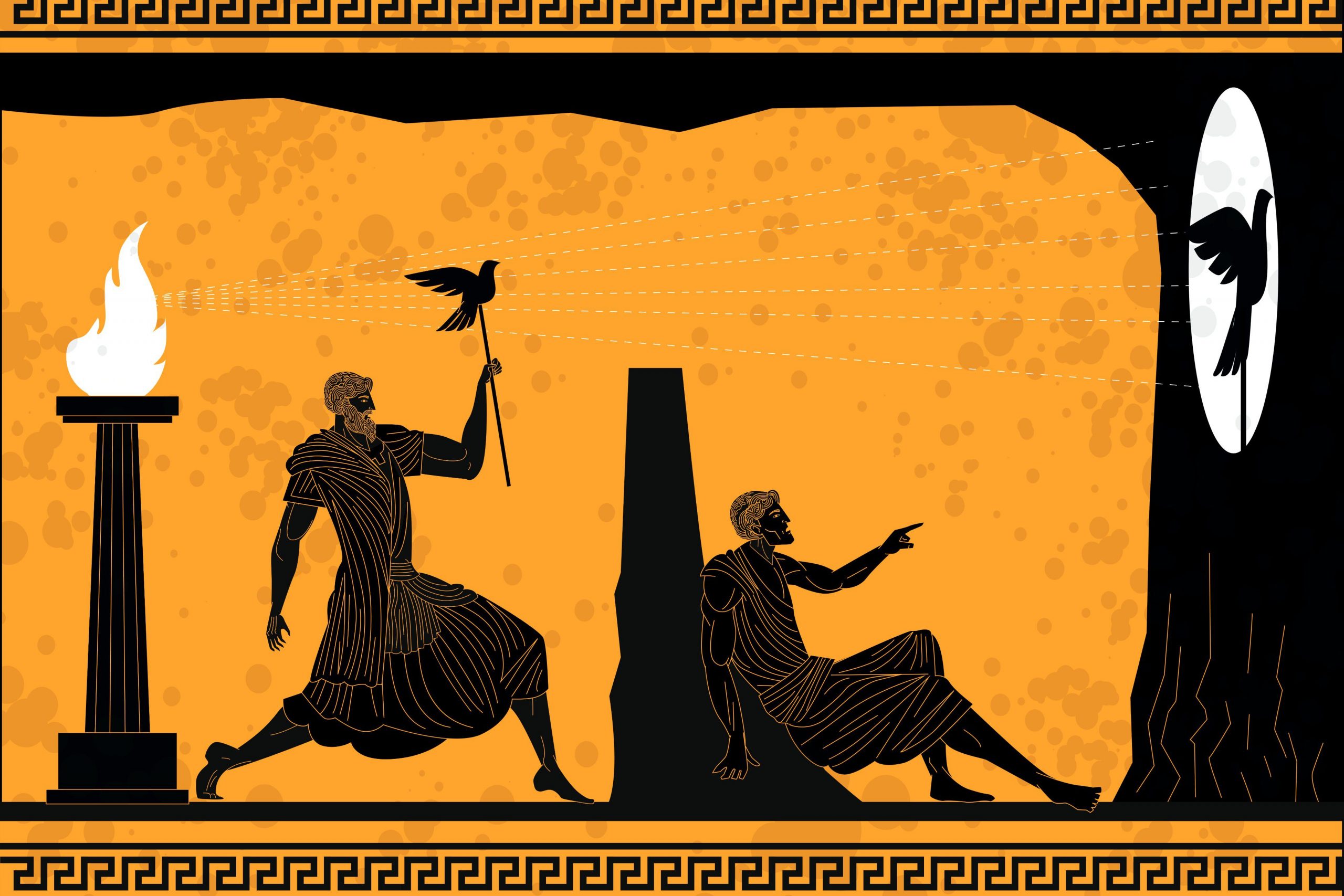 Do I know anything?
Do I know anything?
Plato, “The Allegory of the Cave.” [Optional: Stephen Hicks on Plato’s Allegory of the Cave | Philosophers Explained series]
René Descartes, Meditations on First Philosophy (1641). [Optional: Stephen Hicks on Descartes’s Meditations | Philosophers Explained series]
Optional: Emily Underwood, “How your mind protects you against hallucinations,” Science (2017).
Topic Nine

Is life meaningful or meaningless?
The Meaning of Life—Selected Quotations from Psalms, Shakespeare, Brooke, Marvell, Thoreau, and others.
Albert Camus, “The Myth of Sisyphus” (1942). [Optional: Stephen Hicks on Camus’s “The Myth of Sisyphus” | Philosophers Explained series]
Epictetus, Enchiridion (c. 135 C.E.). Twelve excerpts.
Optional: Stephen Hicks, “Would Immortality Be Worth It?” (1992).
Topic Ten

Is religious morality good or bad for humans?
C. S. Lewis. “Social Morality,” Book 3, Chapter 3 of Mere Christianity (1952). [Optional: Stephen Hicks on Lewis’s Christian Social Morality | Philosophers Explained series]
Sigmund Freud, Chapters 1 and 2 of Civilization and Its Discontents (1930). [Optional: | | Philosophers Explained series]
Other Topics
Toleration?
Augustine, on “Righteous Persecution” (c. 397-418 CE). HTML version.
Thomas Aquinas, “Whether it is lawful to kill sinners?” and “Whether heretics ought to be tolerated?” From Summa Theologica (1265-1274).
John Locke, excerpts from A Letter concerning Toleration (1689).
Tara Smith, “What Good is Religious Freedom? Locke, Rand, and the Non-Religious Case for Respecting It” (Arkansas Law Review 69:4).
Is philosophy worthwhile?
Bertrand Russell, “The Value of Philosophy” (1912). [Optional: Stephen Hicks on | Philosophers Explained series]
Jean-Paul Sartre, “Existentialism Is a Humanism” (1946). [Optional: Stephen Hicks on Sartre’s “Existentialism Is a Humanism” | Philosophers Explained series]
B. F. Skinner, excerpt from Beyond Freedom and Dignity (1971).
Alexis de Tocqueville, “Origin of the Anglo-Americans,” excerpt from Chapter 2, Part 2 of Democracy in America (1835).
Key eras
The Birth of Philosophy: Stephen Hicks, “Why Philosophy Begins with Thales.”
The Renaissance:
The Enlightenment: Steven Pinker, “How the Enlightenment Gave Us Peace, Prosperity, and Progress”
Romanticism:
The Postmodern Era:
Return to the Intellectual History page, the Courses page, or the StephenHicks.org main page.